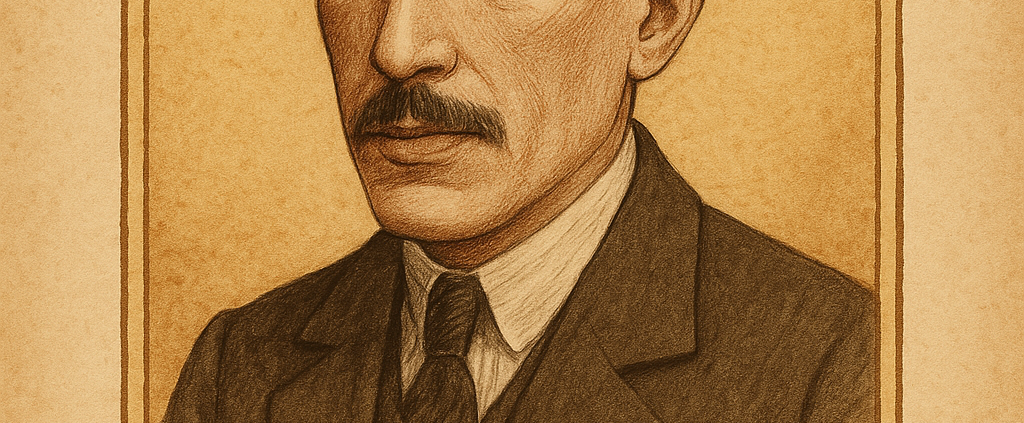René Guénon (1886–1951): Guardian of the Primordial Tradition
“There is no ‘Western’ or ‘Eastern’ metaphysics—only metaphysics, which is universal and timeless.”
René Guénon, a French metaphysician and philosopher born in 1886, devoted his life to unveiling the perennial truths embedded in the world’s great spiritual traditions. In an era increasingly dominated by materialism and fragmentation, Guénon stood as a beacon of synthesis—bridging Hinduism, Sufism, Christianity, Taoism, and other sacred paths through what he called the Primordial Tradition.
After deep studies in Vedanta, Christian mysticism, and Freemasonry, Guénon formally embraced Islam and spent his final decades in Cairo, Egypt, living as a Sufi. From this quiet vantage point, he wrote extensively on metaphysics, symbolism, and initiation—shaping what we now call the Traditionalist School of thought.
Why He Matters to Us
At Vedic Arts, we honor those who sought not division, but union. René Guénon’s writings remind us that beneath the surface forms of ritual, scripture, and culture lies a single luminous thread—truth—woven through every authentic tradition. His work invites us not into comparative religion, but into direct participation in a universal order that reveals itself through silence, symbol, and self-inquiry.
Guénon’s insight is particularly relevant to seekers today who are navigating multiple paths, intuitively sensing connections that transcend doctrine. He offers language, structure, and confidence for those following a path of interior universality.
The Five Unifying Principles of René Guénon
These timeless insights form the bedrock of Guénon’s teachings—and remain deeply resonant for anyone walking a contemplative path across traditions:
1.
The Primordial Tradition is One
Guénon taught that all genuine religions and esoteric paths are expressions of a single sacred origin—what the Vedas call Sanātana Dharma. Whether in Vedanta, Sufism, or Christian mysticism, the ultimate reality is the same. The outer forms may differ, but the inner truth is indivisible.
This means we do not need to “blend” traditions—we only need to go deeply enough into one to touch the center where all truths meet.
2.
Metaphysics Is Beyond Belief
Metaphysical knowledge is not a belief system—it is intellectual intuition. For Guénon, metaphysics refers to direct knowledge of the Real, not to philosophical speculation. It is accessible through purification, study, and initiation—what in the yogic tradition we might call Jnana Yoga.
True knowledge arises from the higher intellect (buddhi), not the reasoning mind (manas).
3.
Exotericism and Esotericism Must Be Distinguished
Guénon drew a clear distinction between the exoteric (outer religious forms) and the esoteric (inner path of realization). While both are necessary, it is the esoteric that leads to spiritual transformation. In every tradition, the esoteric path is subtle, symbolic, and initiatory—it requires preparation and grace.
Without access to esoteric transmission, rituals may nourish the soul, but they do not awaken the spirit.
4.
Initiation Requires Transmission
Authentic realization, Guénon insisted, requires more than sincerity—it requires a living link to a traditional lineage. This is not about hierarchy, but about preserving the continuity of sacred knowledge through symbols, mantras, and living teachers. This principle echoes the parampara tradition in Vedic thought and the silsila of Sufism.
To light a candle, there must be fire. Transmission is not imitation—it is ignition.
5.
Modernity Is a Spiritual Eclipse
Guénon saw the modern world as a civilization in eclipse—rootless, materialistic, and disconnected from metaphysical principles. He did not romanticize the past, but warned that without the sacred, society becomes mechanized and lost. His work is a call to return to the Real—to re-center life around meaning, order, and truth.
His critique is not cynical—it is a compassionate invitation to re-root ourselves in what endures.
For the Seeker of Today
René Guénon offers a map—not to escape culture, but to see through it. He gives the intellectually serious and spiritually devoted seeker a bridge between worlds: between East and West, outer and inner, ancient and now.
His writings may be dense, but they carry the distilled clarity of someone who saw through the veil and left signposts for those still walking.
Recommended Entry Points:
- The Crisis of the Modern World (for cultural perspective)
- Man and His Becoming According to the Vedanta (for Vedic alignment)
- Esoterism and Symbolism (for spiritual synthesis)
In His Honor
At Vedic Arts, we bow to René Guénon as a custodian of the universal flame. His work reminds us that to honor our tradition deeply is to touch the heart of all traditions—and that true knowledge is never divided.
May all who walk the path of synthesis find encouragement in his example, and in the sacred order he so faithfully revealed.
Would you like a matching visual tribute or hero image for this page?


